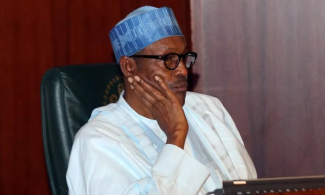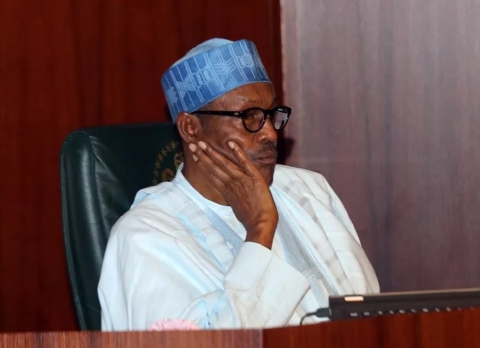
The major catastrophe about Buhari administration is, they are not open to criticism in whatever guise. Once an attempt is made to call out a specific government's policy, as usual, a brigade of its hirelings, propagandists and foot-soldiers will be quick to brandish such a person, group or individual an enemy of state and other unprintable names
These are indeed turbulent times for the entity called Nigeria. One cannot wrap his head around the myriad of issues confronting the nation, and, making a case for each of the problem(s) would be an exercise in futility because each problem is uniquely and distinctively complex that it awed even the most meticulous policy scholars.
In the preceding weeks, we had witnessed horrific spate of violence perpetrated by humans on fellow humans. The carnage can best be described as something out of a movie script.
Incessant bandits attack on communities in North-West Nigeria, a once peaceful agrarian region has spiralled out of control. Scores were killed and communities sacked across Katsina, Zamfara, Sokoto and Kaduna states.
In the North-East, Boko Haram and ISWAP, attacks in Faduma Kolondi community killed 81 persons among them women, children and the community head. It was reported that,the terrorist had a field day when they spent about six hours, killing maiming and setting homes ablaze. This left many wondering where were thousands of soldiers deployed to the area, including the Army Chief, Gen. T Y Buratai, at the time of the attack that shocked the world. Major news media around the globe reported the horrific attack, which led many questioning the approach and conduct of the Nigerian Government in bringing to an end the senseless killing of Innocent individuals.

Last April, Idris Deby joined his country's soldiers at the frontline, appearing in military fatigues, he exudes confidence and inspired his soldiers in an operation that decimated and rid it's territories of Boko Haram. The success of the Chad operation threw a national debate in Nigeria about its modus operandi in executing the war against insurgency, the sincerity of purpose, corruption in top military hierarchy, heist in defence and other military spending as well as welfare of front line soldiers.
The bigger culprit in this whole saga is unarguably the President Muhammadu Buhari. His competence, integrity and commitment has come into question.
Assuming office through popular electoral victory in 2015, and reelected in 2019, most Nigerians hinged their hopes on his self-assumed integrity, zero tolerance for corruption, coupled with his military background as an ex Head of State and General. Many see him as a reformer, a champion needed to redefine leadership in Nigeria and change the status quo. Five years on, that hope has been dashed.
Buhari's incompetence became glaring when he couldn't bring to an end Boko Haram insurgency which formed part of his three cardinal campaigns promise. In fact, a more dangerous monster had emerged-banditry, cattle rustling, kidnappings, armed robbery, and resurgence of farmer-herders clashes are characteristics of the present administration.
Katsina State, the home-state of President Buhari has been under siege as bandits and terrorist have engaged in wanton destruction of lives and properties.
In a pathetic and disgusting twist, in February, villagers in Akata community in Batsari Local Government Area of Katsina State paid a heavy levy imposed on them by the bandits inorder to avoid being attacked. This alone had shown government's failure to protect lives and properties as enshrined in the constitution.
The North for decades is alien to crimes of this magnitude, now, it has become the epicentre of violence and destruction. The North-West is bedevilled with resurgence of armed banditry, cattle rustling and kidnappings. North-East has since become Boko Haram/ISWAP enclave, while the North-Central is the breeding ground of conflict between farmers/herders, ethic militias and rampaging Fulani gun men. Other regions across the country has its own share of insecurity, though on a different scale and proportion.
A lot of questions are raised, the most resounding is, has government run out of ideas and security forces overwhelmed? Attacks of this magnitude are mostly visible and likened in failed states like Somalia, South Sudan and other semi-autonomous entities in the Horn of Africa and Central Africa.
According to Fund For Peace, FFP, an American Think Tank that specializes on the prevention of violence and conflicts, and promotes sustainable peace and security across the globe identified three steps in recognizing a failed state.
Inability of state to control it's territory, inability of state to effectively provide security and public services to its citizens, inability of state to interact with other states as member of the international community.
While Nigeria has not exhibited all three traits to be branded a failed state, many concurred it had features of the first two. President Buhari has failed to provide security and basic public services his citizens (we can't boast of constant power and portable water). Second, it failed to effectively take control of its territories especially on the fringes of the Lake Chad.
Agreed, the major global challenge of the 21st century is that of terrorism and other form of insecurity. However, some leaders had demonstrated dexterity in confronting headlong such challenges. Western nations with the aid of sophisticated technology, Artificial and Human Intelligence were able to curb such challenge. Developing nations in sub Saharan Africa and the Sahel who are prone to attacks had equally demonstrate prowess in defending their countries. Chad's exploit is a stark reminder. In Niger Republic, President Muhammadu Yusoufou had sacked his Army Chief after 70 soldiers were killed by Boko Haram in March, he also ordered investigation into defence spendings and arms contract. These two leaders whose countries share boundary, and some affinity with Nigeria had demonstrated to the "sleeping giant" how to confront insecurity.
Experts in security and policy are lost on the approach and strategy adopted by Nigerian Government that failed to bring to an end insecurity .
Could the President truly suffering from dementia? Is this the Buhari we (including myself) massively voted for, due to his past military exploit in the Civil War, Maitastine Crisis, and leading an onslaught on Chad militias supported by Hissene Habre who took Nigeria's territory in Borno during the presidency of Shehu Shagari? Is the Jubril Al-sudani fairytale theory true? Are the Merchants of War involved? Are the service and other security chiefs benefiting from the needless war? Is Buhari under a spell resulting from Voodooism, Jaz, Tsafi, African/Black magic which prevents him from acting fearlessly and ruthlessly pushing insurgents into extermination? Are foreigners and international collaborators involved?
These and many more are questions begging for answers. How else can a president refuse to heed calls from Nigerians to sack the service chiefs whom had obviously run out of ideas and outlive their usefulness. There is a grand rule in football- never change a winning team. But, Buhari's security team aren't winning, therefore, it would be counterproductive to still maintain them in their respective capacity.
There is an urgent need to adopt an Artificial and Human Intelligence as the number one strategy in executing a 21st century technology-base war.
The use of drones for reconnaissance and attacks has not been effectively explored by the government so far. Drone attacks has a 90 per cent precision rating on target, and human causality is zero,and cost effective. The Nigerian Defence Industry Corporation should not be reduced to a furniture making industry. Now is the moment to test it's efficacy and justify millions spent since its inception which to among others things is, production of military hardware.
The NDA should review its admission policy to technology based,where first-class graduates of Computer Science, Engineering, Physics, Chemistry and other science based courses are given priority.
Whatever gains this administration could attribute to itself had been blurred by insecurity. Agriculture which would have been a major catalyst for reinvigorating the economy has been worst-hit by insecurity. Farmers can no longer access their farmlands, as either they are taken over by bandits, or, fear of being kidnapped. As a show of policy misplaced priority, the Buhari government has proposed to spend N12bn in fighting pest destroying farmlands,that humongous amount, when channelled to fighting insecurity could be more appropriate. Insurgency and insecurity are more dangerous to agriculture than pest.
The major catastrophe about Buhari administration is, they are not open to criticism in whatever guise. Once an attempt is made to call out a specific government's policy, as usual, a brigade of its hirelings, propagandists and foot-soldiers will be quick to brandish such a person, group or individual an enemy of state and other unprintable names
When residents of Katsina heed the call of a Coalition of Northern Groups for a peaceful protest,shortly after, security operatives whisked the convener to Abuja and detained him. Ironically, Buhari and other notable persons in his administration had in the past participated in protests against ex-President Jonathan. Infact, those who criticized and call out ex president Jonathan had lost their voice in this administration. Those who dared speak out are either rounded off,or called names,eg Northern Elders Forum's Prof.Ango Abdullahi.
Nigerians has been fair to President Buhari, many had ignored his flaws in other sectors, like economy, infrastructure and education etc. The central focus is on security.
The infighting between the first family, and gunshot in Aso villa had proven that the President had lost it. Furthermore, the endless crisis in his Party, the APC, his inability to broker peace in the Edo chapter and settle the rift between Mr Oshimohle and Governor Obaseki signaled the President cannot be a peace maker and that to some extent explain the continued insurgency and insecurity in the country.
However, propagandists were quick to spurn a narrative that his detractors within are undermining his efforts.
But like Dr Naja'atu Mohammed posited, posterity and history will judge Pres.Buhari solely, not some imaginary persons whom stalked, sabotage and stagnated his regime. Because Nigerians voted for him.
Less than three years to the end of the administration, much can still be done to salvage the security challenges. Sack the service chiefs,inject new blood, with new zeal, vigour, strategy and passion. Set out a target and timeframe, for them-end insecurity of get fired! That's how a serious C-in-C discharges his duty, authoritatively. You don't keep doing same thing over and over, and expect different results. If President Buhari wants to leave behind an enduring legacy so that posterity would be kind to him, he needs to act now. As it were, he has failed to secure the lives and property of Nigerians,bloodletting has become common place. Little wonder, many has dubbed him the sleeping president.
Abdullah D Mohammed is with the Department of Political Science and International Studies at the Ahmadu Bello University, Zaria. He writes from Kano.